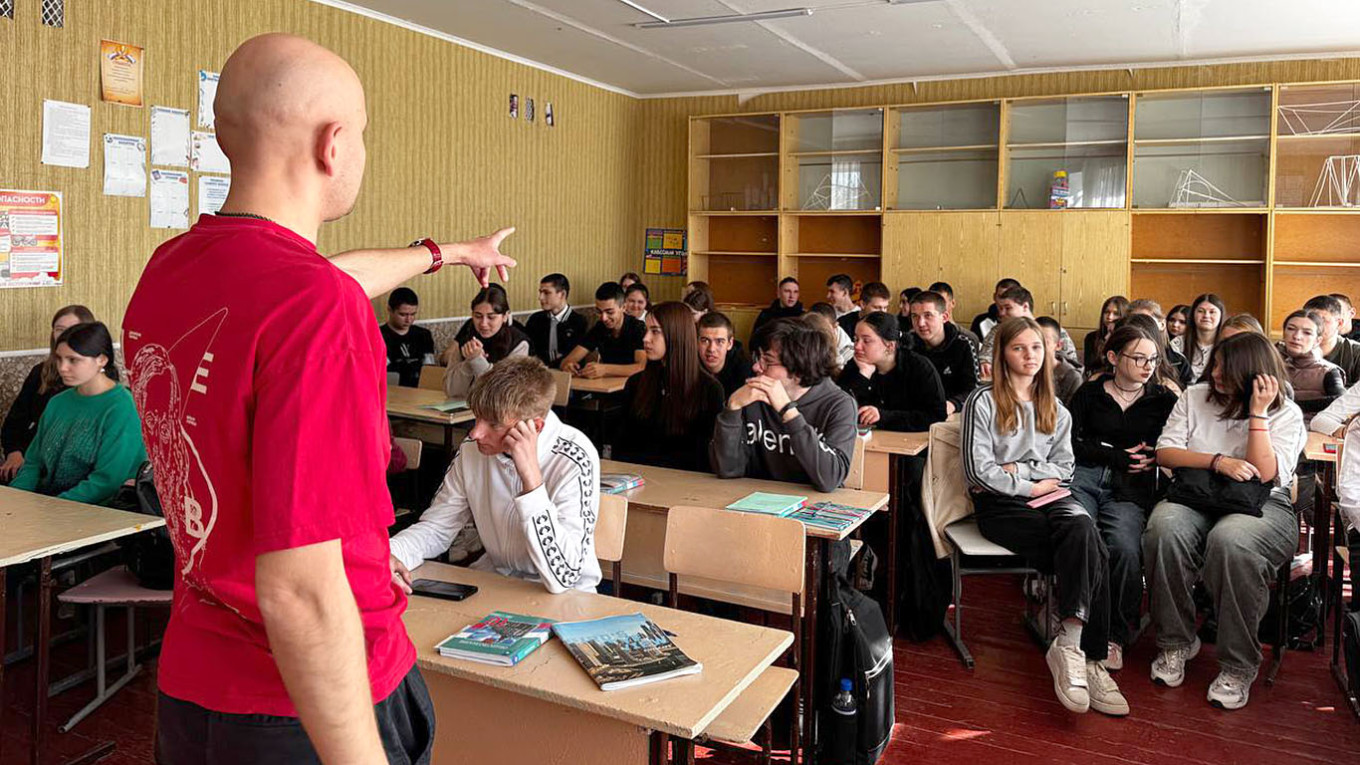“We are fortunate to be living in a remarkable era where anyone can get involved in a significant media movement,” remarks pro-war pop artist Nikolai Baskov.
He is encouraging children and teenagers in the occupied regions of Ukraine to participate in MediaAttraction, a media school established by the pro-Kremlin youth organization, Movement of the First.
Shortly after the full-scale war against Ukraine began in 2022, Russian authorities initiated the creation of media schools aimed at teenagers in occupied areas, instructing them on camera use and the path to becoming “real journalists.”
Since then, MediaAttraction schools have been launched in Mariupol, Henichesk, Donetsk, Luhansk, and various other occupied cities. Experts believe this is a state-driven initiative intended to develop Kremlin-aligned bloggers and journalists in these regions.
Currently, the project is hosting a journalism contest where students are invited to write about their “new homeland.” The top five entries will be showcased in the Movement’s Magazine of the First. Additional rewards include a copy of “History of the Russian State” by Nikolai Karamzin, a foundational work of imperial Russian history.
The Magazine of the First made its debut in February, featuring a poem by Denis Dymchenko, a Russian soldier who lost his life in Ukraine. Another piece honored Dmitry Savluchenko, a Russian-appointed official responsible for youth policies in the Kherson region, who was killed in 2022 by a car bomb.
Savluchenko “never engaged in political discourse,” writes Karolina Norchenko, an eighth grader and member of the Movement of the First’s Kherson branch. “He focused solely on working with children, families, and youth.”
Her tribute was part of a section titled “Heroes of the Liberated Kherson Region.”
Other sections in the magazine include “Russia Is My Home,” “Volunteering,” “Education,” and “History.” In the history section, students are encouraged to write about World War II veterans and Russian soldiers from the Kherson region who fought in the current war in Ukraine.
“With our reintegration into the Russian Federation, our lives have undergone significant changes,” stated Sofiya Poleshchuk, another youth movement member, during the magazine’s launch event. “The government pays us special attention, offering extensive opportunities for education, creativity, and personal development. This was not the case before — under Ukraine, we felt a lack of support and seen fewer opportunities.”
In addition to MediaAttraction, the Movement of the First actively promotes the neo-imperial ideology of the “Russian World” throughout occupied Ukraine.
In April, a series of lectures on the “Russian World” took place across 16 schools in occupied Kherson. According to local authorities installed by Russia, over 290 students from grades 5 to 11 participated in these discussions.
These lectures are part of an initiative led by Alexei Lavrentyev, the regional head of the movement, and are funded by Rosmolodezh, Russia’s federal youth agency.
“Such educational programs provide children and teenagers with not only knowledge but also a clearer understanding of their historical and cultural identity,” Lavrentyev stated.
Among the initiative’s offerings is a video series called “Significant Adult,” created by 15-year-old Lenya, a student in Kherson aspiring to be a journalist. In this show, she interviews representatives from the Russian occupation administration, including Vladimir Saldo, the Moscow-appointed head of Kherson.
Despite receiving praise from propagandist Alexander Malkevich, “Significant Adult” has not gained widespread popularity online, with fewer than 10 followers on VK and only 28 subscribers on RuTube, Russia’s version of YouTube.
“If someone is eager to learn, the pathways to public service are open,” added occupying official Yevgeny Brykov.
One graduate from Malkevich’s school appeared in a video where she and other teenagers buried their Ukrainian passports. In the clip, they express their disillusionment with the Ukrainian government.
“We’re fed up. We no longer wish to do anything with Ukraine. We’re unsure if it will even exist in the future,” one of the girls states. The video concludes with the phrase “Now we are with Russia,” accompanied by the song “Call Me With You” by Alla Pugacheva, a Russian singer who has publicly criticized the war.
Malkevich shared the video, commenting positively, “I’ve already reached out to her.”
In 2023, Malkevich published a textbook titled “Real Russian Journalism for the New Regions,” which he described as a remedy for what he referred to as “unhinged Ukrainian propaganda.”
“Listen to the majority’s voice, and you won’t be misled,” advises Malkevich in his book, as quoted by the pro-Russian Kherson News Agency.
Russia’s initiatives to foster loyal young journalists also include competitions such as YUNKOR-2025, which wrapped up this spring with five teams of teenagers from Mariupol.
One group of high school girls produced a state television-style video showcasing life in Mariupol under Russian administration. It features panoramic shots of Lenin Square (renamed by Russian authorities), the Azov Sea pier, blooming chestnut trees, and the neo-Gothic mansion of notable Mariupol doctor Sergei Gamper.
“Flourishing chestnut trees, seagulls, factories billowing smoke, and the tranquil shimmer of the sea all conveyed a sense of peaceful and thriving life [in Mariupol]. That was how it was until signs of misanthropy began to appear in Kyiv,” the video’s narrator states.
The report concludes with the assertion: “Mariupol is part of our shared history.”
In Mariupol, the Movement of the First operates youth media centers with assistance from the Donbass Media Center (DMC), a pro-Russian initiative aimed at fostering interaction with new media platforms, as reported by CNN recently.
Teenagers who complete their training often share videos highlighting how Russia is “revitalizing” the city. One young vlogger mentioned to CNN that these videos are rapidly becoming a trend.
However, the DMC is not the sole pro-Russian media venture in the city. This spring, the Donetsk chapter of the Russian youth movement Yunarmiya (“Youth Army”) applied for a presidential grant to establish four media studios in Donetsk, Mariupol, Shakhtarsk, and Kirovsk. They requested 997,000 rubles (approximately $12,000), similar to the amount spent by the Kremlin to launch the Mariupol media school.
According to the grant proposal, children and teenagers at these studios will also produce a film about Yunarmiya in their region, which is scheduled for premiere in the fall to coincide with the anniversary of Russia’s annexation of the Luhansk, Donetsk, Kherson, and Zaporizhzhia regions in September 2022.
Analysts suggest these efforts aim to create a new generation of Kremlin-aligned war correspondents, contrasting with the current group of military bloggers who often critique Russia’s handling of the conflict.
“Today’s war correspondents do not demonstrate much loyalty to the Russian authorities, which frustrates the Kremlin,” stated Ivan Stupak, an adviser to the Ukrainian parliament’s national security committee, to The Moscow Times. “By establishing these media schools, the government is fostering a new generation of war correspondents from the ground up. Over time, these young people will evolve into war reporters who will operate Telegram channels and TikTok accounts that align with the Kremlin’s narrative.”
“The primary tool for these future war correspondents will be their audience. They will not be in a position to criticize the authorities because these bloggers are being cultivated from the very beginning by the Russian state,” Stupak concluded.

